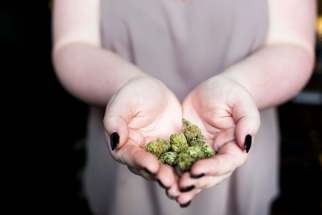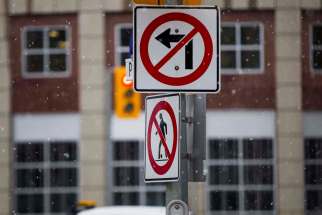Time for ‘the talk’? Whether you rap about reefer or converse about cannabis, discussing pot with your child should be a two-way street
Read this article for free:
or
Already have an account? Log in here »
To continue reading, please subscribe:
Monthly Digital Subscription
$0 for the first 4 weeks*
- Enjoy unlimited reading on winnipegfreepress.com
- Read the E-Edition, our digital replica newspaper
- Access News Break, our award-winning app
- Play interactive puzzles
*No charge for 4 weeks then price increases to the regular rate of $19.00 plus GST every four weeks. Offer available to new and qualified returning subscribers only. Cancel any time.
Monthly Digital Subscription
$4.75/week*
- Enjoy unlimited reading on winnipegfreepress.com
- Read the E-Edition, our digital replica newspaper
- Access News Break, our award-winning app
- Play interactive puzzles
*Billed as $19 plus GST every four weeks. Cancel any time.
To continue reading, please subscribe:
Add Free Press access to your Brandon Sun subscription for only an additional
$1 for the first 4 weeks*
*Your next subscription payment will increase by $1.00 and you will be charged $16.99 plus GST for four weeks. After four weeks, your payment will increase to $23.99 plus GST every four weeks.
Read unlimited articles for free today:
or
Already have an account? Log in here »
Hey there, time traveller!
This article was published 15/10/2018 (2614 days ago), so information in it may no longer be current.
Hep-cat or hypocrite. Realist or moralist.
As the date for marijuana legalization approaches, parents of a certain age are navigating the best way to talk about pot with their kids.
Pot never did much for Lisa in her younger years.
“I was a very, very recreational user, mostly because it just made me sleepy,” said Lisa, who is now in her early 50s.
These days, Lisa, who works in health care and did not want to use her real name, uses medical marijuana as a sleep aid and to control symptoms of an unrelated health issue.
Lisa talks to her two teenage sons about marijuana “all the time,” she said.
“Partly because my partner is a recovering addict. So he and I have gone to some lengths to share parts of his story with them so they would have a real-life example of somebody who lived that whole experience: what it cost him, and how he found recovery.”
STICK TO THE FACTS
Lisa said she is careful to stick to the facts when talking about marijuana with her sons.
“I have never come out and said drugs are evil and bad and you must never do them,” she said. “That’s what I grew up with and my parents really did demonize anybody who used any kind of recreational drugs.”
Until recently, Lisa’s talking points have focused mainly on marijuana being illegal. “That was always my first concern: you don’t know your sources and you could pay a legal price for using and you are supporting organized crime,” she said.
Recently, Lisa’s friend, who is a doctor, told her about a middle-aged patient who bought pot from a street dealer. It was contaminated with fentanyl, and he died.
“We made a point of sharing that with the boys so they would understand the danger of unknown connections,” she said. “Really, I’m just relieved that there will be some place legal where they can access (marijuana), where there is some control over the final product.”‘It’s really from a health perspective that I talk to them, not morality. That’s just stupid; a society that OKs one set of drugs and not another kind of has its head up its ass’ – Lisa, on conversations about pot with her kids
Many of Lisa’s discussions with her sons focus on health issues and the possible effects using marijuana has on developing brains.
“It’s really from a health perspective that I talk to them, not morality,” she said. “That’s just stupid; a society that OKs one set of drugs and not another kind of has its head up its ass.”
Lisa is honest with her kids about her past drug use and her use of cannabis today.
“Hypocrisy is a big issue for me, personally,” she said. “I couldn’t sit there and say ‘don’t do this’ and ‘it’s bad’ knowing my own past. I wanted also for there to be lines of communication so they wouldn’t be afraid to talk about that experience if it happened.”
It’s up to parents to decide if it’s best to disclose their drug past to their children, said Kathleen Keating-Toews, an education and research specialist at the Addictions Foundation of Manitoba.
“It depends on the context in which that conversation is happening,” Keating-Toews said. “Why is the young person wanting to know that? Is it because they are simply curious? Or is it because they feel they are in the hot seat and that if they turn it on the parent, maybe they aren’t talking about themselves anymore?
“Sometimes, I think parents feel like they are stuck in a trap. If they have used drugs before or currently use drugs, then they are a hypocrite. If they (haven’t used drugs), they don’t have any credibility and don’t know what they are talking about. If they are getting that question, ask the young person why is it important that they know that. Depending on the parents’ comfort level, they may or may not choose to answer that question.”
TWO-WAY CONVERSATION
Pot talks should be a two-way conversation, not a lecture, Keating-Toews said.
“Kids are maybe going to be interpreting information differently, just because they are young,” she said. “Don’t lecture kids — they are more likely to tune you out if you moralize and preach at them. We are hoping that parents can be calm and active listeners to their young people.”
Fred has never smoked marijuana and expects his 15-year-old daughter will follow his lead.
Fred and his wife’s discussions with their daughter have focused on making good decisions and how to reach her goals.
“We talk about how a decision will lead to success in your life or no success in your life and where (she) wants to be,” Fred said. “At the end of the day, you have to ask, is (using marijuana) going to help you?… Probably not, and she totally agrees.”
In their most recent conversation, Fred told his daughter she could be honest with her parents if she chose to “experiment” with marijuana.
“We’re not the type of parents who reprimand to the point the child’s not going to come to us when they do need help,” he said.
“If she does choose to (use marijuana), I don’t think we can condemn it, because society now is not really condemning it. You kinda have to move with the times.
“Just because we don’t want to take part in it doesn’t mean she can’t. When she is the legal age, if she chooses that, that’s fine, but that is going to be her decision.”
A change in marijuana’s legal status will not change how the addictions foundation addresses its abuse, Keating-Toews said.
“Just because a substance is legal doesn’t make it any safer,” she said. “We know alcohol is a legal substance, but it still causes very high rates of accidents, injuries and deaths, particularly among young people…
“It’s important for (people) to know that all drugs have the potential to be harmful, depending on what their relationship is with it.”
dean.pritchard@freepress.mb.ca

Someone once said a journalist is just a reporter in a good suit. Dean Pritchard doesn’t own a good suit. But he knows a good lawsuit.
Our newsroom depends on a growing audience of readers to power our journalism. If you are not a paid reader, please consider becoming a subscriber.
Our newsroom depends on its audience of readers to power our journalism. Thank you for your support.
History
Updated on Monday, October 15, 2018 6:58 PM CDT: Adds background image









